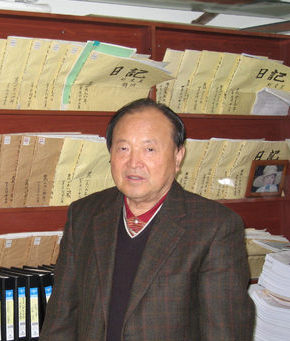 |
Seoul man places in Guinness Book of World Records for his book of memories
A 68-year-old Seoul man has been keeping a diary since probably 1948. Park Rae-uk, who owns a herbal medicine shop in Jayang-dong, says he began writing daily entries "because my mother taught me to write down what I do every day in order to become someone of significance. I keep her advice in mind at all times, and now it has been fifty years," he said.
Park was recognized by the Guinness Book of World Records in 1997 for having the longest-running diary, though naturally it exists in more than a few volumes, which he recently donated to the National Folk Museum.
The diary represents a history of modern Korea, since it covers the Korean War, the dictatorships, the years of industrialization and every other period in Korean social history. Considering it part of his diary, Park also includes prescriptions, account books, receipts, and other documents.
"I donated it all without hesitation in order to leave a record that would allow people to see the history of the times through one individual's life," he said.
The entries for August 8 and September 2, 1950 describe guerillas arriving at his house in Gwangju. Calling his father a "reactionary," they took food, clothes, and everything of worth in the house at the time. From then on, the perpetrators would count the vegetables growing in the family's garden. Both of Park's parents died in the war, leaving him to grow up an orphan. He wrote down a lot of prices. The price of sesame oil in 1956 was 100 "hwan" (there is 10 hwan per 1 won) a bottle. Entry to a public bathhouse cost 50 hwan, a haircut 60, a movie 30, a bus ride or book of matches cost 10 hwan. A roll of film cost 400 hwan - the same price as 2.4 kg of pork. These days the same amount of pork is far more expensive than a roll of film, so readers can see how Korea was primarily an agricultural country at the time. Park also donated 10 volumes of account books from between 1961 and 2003, sixteen volumes of prescriptions from between 1971 and 2001, his national identification card from 1962, and his certificate of military service from 1961, as well as bank books and receipts. He says he wishes someone would use the material to write a novel "based on the powerless common people." The museum says it will release the contents of the diary once it has looked over the material. Please direct questions or comments to [englishhani@hani.co.kr]





